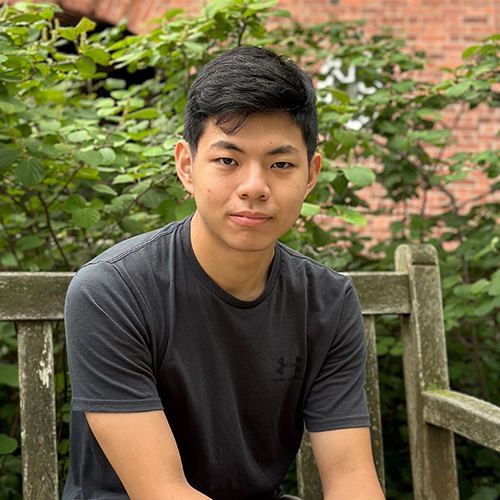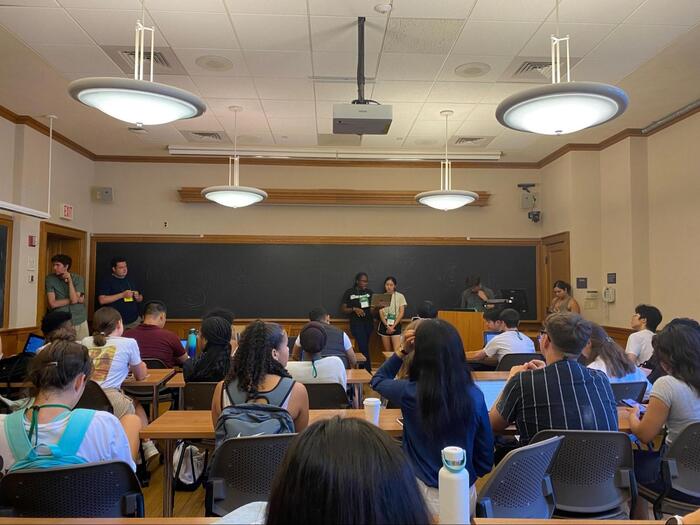
How do you address a global crisis? Is there a correct way of doing it? Across all academic interdisciplinary courses, PLE has a very unique taste to its symposiums: a two-day crisis simulation project divided across three universes: Blue, Red, and Grey. It gave students the opportunity to enjoy role-playing real-life government officials, NGO leaders, and crisis victims. From my end, I was a board member part of Greenpeace Australia in the Red Universe.
First Day: Typhoon Julian Strikes Kiribati
We were wrong to think that the first day would kick-off to a light start when a typhoon forced Kiribati to call for international help. Congress, world leaders, and international aid organizations hosted many meetings to draft resolutions on ways they could support. As we could not settle disagreements, Kiribati faced more problems as the typhoon refused to abate. Whether that is helping to relocate over 160,000 refugees from the joint rescue efforts between the United States, Japan, and New Zealand or providing aid for infrastructure rebuilding by the World Bank and IMF, the people of Kiribati were saved at last.
Second Day: Paris 2.0 Climate Summit
Could we draft a better proposal than the first Paris Agreement? As someone who cares greatly about environmental sustainability, I knew this day’s theme sought to attest to my cooperative abilities to solve climate change. I was interviewed by the Press and attended conferences on how Greenpeace could promote environmental efforts on climate change mitigation.
Although not everyone was satisfied with the conclusion, we agreed to disagree on our climate action ideas and reflected upon the difficulties of the real-life implications of the conference. And hopefully, Paris Agreement 2.0 is better than the previous one:)
The Press
“Greenpeace Advisor Accuses US Government of ‘Racism’ in IMF Aid Petition” reads the WSJ; “Kiribati Asks for Aid, America’s Response ‘Let’s talk about fish?’” reads Global Times. Personally, I find the Press the most entertaining to be surrounded with. Their control information outflow accurately mirrors the cunning intents of the Press in real life. On one hand, they could pick up the most trivial things said in the meetings and spread it across the media to undermine anyone’s intention. Their ludicrous remarks certainly spread laughter amongst the viewers.
On the other hand, they could work for you. As the Greenpeace organization was often left unrecognized amid the mayhem of this global crisis. The Press gives us a voice and a stage to promote our interests and projects across the international community. Because of the Press, we were able to protest against nations that were indifferent to our proposals prior, turning us into a popular yet controversial regime. But isn’t this just the world we live in?

Concluding Remarks
All in all, the Symposium allowed me to experience the synergies between international relations, law, and philosophy, broadening my interest in what I want to pursue in the future.
Although the Press overwhelmed the final resolution conference and no consensus was reached, I had a fun time engaging and cooperating in diplomatic relations with an international student body that has a strong passion for PLE.
Read the following to hear from other students:
“The symposium was a grounding experience that shows how unfair modern politics are when you are part of non-government organizations.”
-Jonathan S
“An eye-opening experience in the shoes of political figures, the symposium made me realize how complicated politics and media can be.”
-James G
“It was a hands-on experience that deepened my insights into negotiation and strategy.”
-Daniel R
“It was a fun way to learn about the complexities of managing a country and collaborating with new people.”
-Justin L
“As the representative of the Fiji Islands, I learned that some countries don’t always have a say in international affairs. The symposium made me better understand the frustration that these countries could be in in reality. ”
-Lucy W
Author Details:
Shan Kai (Terry) Wu
Politics, Law & Economics
Taiwan